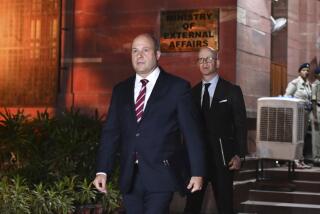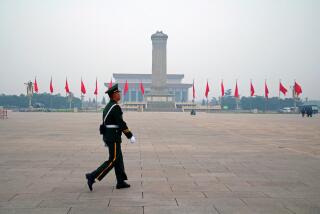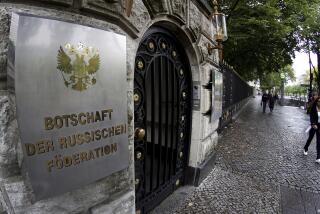KGB Chief in Britain Defects; 25 Spies Ousted : Station Chief Granted Asylum; Major Setback to Soviet Intelligence Operations Reported
- Share via
LONDON — In what Western officials described as a major blow to Soviet intelligence, the British Foreign Office on Thursday announced the defection of the senior KGB officer at the Soviet Embassy here and ordered the expulsion of 25 other Soviet espionage agents he identified.
The defector, Oleg A. Gordievski, 46, had the rank of counselor at the embassy. A veteran of 23 years’ service with the KGB, the Soviet intelligence agency, Gordievski is said to have intimate knowledge of Soviet espionage operations in Britain, along with more general but equally valuable information about such operations elsewhere in Europe.
Granted Asylum
The Foreign Office said Gordievski defected and was granted asylum here because he “wished to become a citizen of a democratic country and live in a free society.”
His defection “is a very substantial coup for our security services,” Foreign Secretary Geoffrey Howe said in an interview with the British Broadcasting Corp. The 25 Soviet agents “were engaging in intelligence activities of a kind and on a scale that was unacceptable, and this action (the mass expulsion) is therefore necessary for the defense of national security.”
Gordievski’s defection, followed by the largest expulsion of Soviet diplomats from Britain in 14 years, threatens to disturb Moscow’s relations with a key Western government as preparations are being made for a Soviet-American summit, scheduled for Nov. 19-20 in Geneva.
Speaking to reporters at the gates to the embassy, in London’s fashionable Kensington district, a senior Soviet diplomat protested the expulsions, calling them “provocative.”
“All accusations or intonations as to the alleged illegal activities of the Soviet representatives have nothing to do with reality,” the official, press counselor Alexei Nikiforov, said. “The Soviet Embassy most strongly protests against these provocative measures.”
Six of the 25 Soviet agents ordered expelled were diplomats accredited to the embassy, and at least four others were nominally newsmen, representing Radio Moscow, the Soviet news agency Tass, the government newspaper Izvestia and the Communist Party daily Pravda. The others were described as technicians, trade officials and translators.
The diplomats included the heads of the embassy’s cultural and science and technology sections. All were given three weeks to leave the country.
Although Gordievski is said to have defected within the last few days, he had reportedly been in contact with agents from Britain’s MI5, the internal security organization, for an extensive period of time.
Taken Over Recently
He arrived in Britain in June, 1982, but had taken over only recently as KGB chief at the embassy, British intelligences sources said. It is considered likely that, as head of KGB operations here, he would be able to identify not only Soviet spies but also British agents working for the Soviets.
Gordievski “was in a position to know full details of Soviet intelligence activities and personnel in this country,” the Foreign Office statement said.
There was a report from Denmark that Gordievski had been a double agent for the West since the 1970s, when he served with the Soviet Embassy in Copenhagen. Erik Ninn-Hansen, Denmark’s justice minister, said on Danish television that Gordievski “supplied police intelligence with much information, also on conversations he conducted, and he was an extremely important source of information of significance.”
The Danish minister said British and Danish counterintelligence services had been in contact about Gordievski for some time, although he would not elaborate. The Foreign Office here declined to comment on Ninn-Hansen’s remarks.
British intelligence sources said Gordievski worked for nearly 10 years training KGB agents in the Soviet Union before they were sent abroad.
The Soviet charge d’affaires in London, Lev A. Parchine, was summoned to the Foreign Office on Thursday morning. He was told of Gordievski’s defection and, at the same time, of the expulsions.
Foreign Office officials said he was informed that “a significant number of Soviet representatives in London have been engaged in intelligence activities, which were, of course, totally incompatible with their state and their declared task.”
Location Not Disclosed
Parchine asked to see Gordievski, and the Foreign Office replied that if Gordievski wished to see him, he could. The defector has reportedly been taken from London to an undisclosed location in the south of England.
Gordievski is married and has two children, but the Foreign Office would not comment on his family’s status or their whereabouts.
Prime Minister Margaret Thatcher is reported to have been briefed in detail on the defection and to have given her personal approval for the expulsions. In previous instances of diplomatic expulsions, she has been informed only after the decision was taken.
In an apparent effort to limit the damage to Soviet-British relations, which had been improving gradually since last December’s visit by Mikhail S. Gorbachev, now the Soviet leader, and to preserve the fragile nature of East-West ties in advance of the Geneva summit, the Foreign Office statement announcing the expulsions spoke of a need for continued dialogue.
“The government attaches great importance to the development of a realistic dialogue with the Soviet Union which can contribute to mutual confidence between East and West,” it said.
Later, Foreign Secretary Howe repeated this message.
“We’ve worked hard to improve relations with Moscow and will continue to do so,” he said. “The world needs improved East-West relations, and Britain is willing to play its part, but not at the price of national security.”
Softening the Impact
The relatively long period of time the Soviets were given in which to leave the country, although not unprecedented in such cases, was also seen as an attempt to soften the political impact of the expulsions. In previous instances, East Bloc diplomats charged with spying have been given between one and four weeks to leave.
The Foreign Office also announced Thursday its willingness to accept an increase in the number of Soviet diplomats in London from 39 to 46, and to permit the six expelled diplomats to be replaced. Still, Foreign Office officials admitted that the expulsion will complicate British-Soviet relations and possibly lead to the expulsion of British diplomats in Moscow.
“Obviously this will influence things, but we are trying to limit the damage,” one official commented, asking not to be identified by name.
105 Ousted in 1971
The 25 expulsions constituted the largest number in Britain since 1971, when 105 Soviets were expelled, also on charges of espionage.
Last April, five Soviet officials in London, including the naval attache and an executive of the Soviet national airline Aeroflot, were sent home after being named as spies. Despite the upbeat tone of British-Soviet relations at the time, the Soviets quickly retaliated by ordering three British diplomats out of Moscow.
Foreign Office officials said Thursday that any Soviet reprisal for the expulsion would be “totally unjustified.”
Britain’s attempts to contain the impact of the incident reflects a turnabout in Thatcher’s attitude toward the Soviet Union, reportedly taken in the course of a long break after her election victory in 1983.
She is said to have abandoned her rigid view of Moscow and committed herself to developing some form of working relationship with the Soviets.
More to Read
Sign up for Essential California
The most important California stories and recommendations in your inbox every morning.
You may occasionally receive promotional content from the Los Angeles Times.










